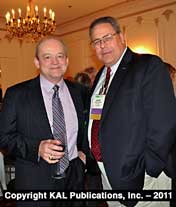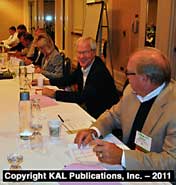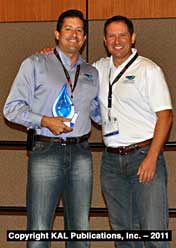
December 2011 Issue Highlights
For more complete coverage, send us an e-mail to
request a back
issue.

For more complete coverage, send us an e-mail to
request a back
issue.


Petroleum Marketers Association of America Fall Meeting



Western Carwash Association Convention and Trade Show


Arizona Petroleum Marketers Association Convention
Want to see the photos that didn't make the issue? Check out the Cutting Room Floor.
Nella To Acquire Fleet Card Fuels
New Downstream Company Brings Return of Phillips
66
Fina Stations To Be Rebranded To Alon
BP Buys Ethanol Mills In Brazil
U.S. Biodiesel Expected To Hit 800 Million
Gallons
AUBURN, CA. — Nella Oil Company, based here, reports that it has signed an agreement to purchase Fleet Card Fuels and its subsidiary, Cal Valley Equipment, both based in Bakersfield, CA. Terms of the deal were not disclosed.
Included in the deal are Fleet Card Fuels assets including service stations, cardlocks, travel centers, fuel transporters, and fuel equipment and service companies. The company operates primarily in Central and Southern California, including service station holdings in Los Angeles, San Bernardino, Riverside and Orange counties that were acquired two years ago from Sabco Petroleum.
It is expected that at least a portion of the Fleet Card Fuels service stations will be converted to Nella's Flyers brand, which has a strong market presence in Northern California and Nevada.
Walt Dwelle, managing partner of Nella, noted that "The companies are very similar in terms of their heritage, marketing styles, and emphasis on customer service. The geographic fit will give Flyers a much stronger presence throughout California and we are very pleased to welcome the Fleet Card and Cal Valley teams to the Flyers family."
Dwelle also noted that the company plans to keep an office open in Bakersfield and they "anticipate the retention of a vast majority of the Fleet Card staff."
Announcing the deal at the end of October, Fleet Card President Henry Medina said it "strengthens both operations strategically, geographically" and, given tough economic conditions, "it really strengthens their position in the marketplace."
The companies say they plan to complete the sale shortly after the first of the year.
HOUSTON, TX. — As part of the planned separation of ConocoPhillips into separate upstream and downstream companies, the major oil announced that its new downstream company will be be named Phillips 66 and will be headquartered in Houston.
"Phillips 66 has strong brand recognition and value and it provides a link between our rich history and our exciting future," said Greg Garland, designated chairman and chief executive officer of Phillips 66. "Our name reflects an independent spirit and drive — two attributes of our future company."
As part of the change, ConocoPhillips says it will transfer its "consumer-facing brands" — including 76, Conoco, Jet, Kendall, and Phillips — all to Phillips 66. The company says they will determine the fate of the brands following the completion of the ConocoPhillips corporate split.
There is speculation that Phillips 66 will begin rebranding service stations currently flying its other brands; however, this is unconfirmed by the major oil company.
In an announcement made in mid-November, the new Phillips 66 company will include the current ConocoPhillips Commercial, Marketing, Transportation and Business Development group, the Global Refining, Projects and Procurement group, and support groups including Finance, Government Relations, Legal, Technology, and Health, Safety, and Environment.
The Phillips 66 commercial group will market crude oil, intermediates, natural gas liquids and commercial marine products. The upstream division, which will keep the ConocoPhillips name, will market gas and power, including LNG.
As part of the fallout from the split, Willie Chiang, who had been serving as vice president of ConocoPhillips' refining and marketing division, has announced he will retire from the company when the break into two companies is completed. ConocoPhillips CEO Jim Mulva had already announced in July that he would retire from the company at the end of the spinoff process.
Garland, who will be taking the reins of Phillips 66 as chairman and CEO, is currently serving as senior vice president of ConocoPhillips' Americas exploration and production division.
The ConocoPhillips split into two companies is expected to be completed in the second quarter of 2012. The company reports it "is making progress on the regulatory steps needed to complete the repositioning transaction." The deal will be complete "subject to market conditions, customary regulatory approvals, the receipt of an affirmative ruling from the U.S. Internal Revenue Service, the execution of separation and intercompany agreements and final board approval."
DALLAS, TX. — Alon Brands, which operates the Fina network of gasoline stations, has announced that they will rebrand all of their stations to the Alon brand, beginning in January.
Alon Brands purchased in the Fina service stations, as well as a refinery, pipelines, and terminals from Total SA in August 2000 and has been operating them under the 51-year-old Fina name in Arizona, Arkansas, Colorado, New Mexico, and Utah in the west as well as in Oklahoma, Texas and Louisiana. The company currently operates approximately 1,000 service stations.
With the planned conversion, the company says "the four letters of Fina will be replaced by the four letters of Alon" and the service stations will keep the current red, white, and blue image plan.
"This process signals change to our retail consumers, better aligns us to our dependable source of supply and builds on existing brand equity," stated Alon President Kyle McKeen. "The brand change will give people a reason to take a look — or second look — at us. But it's not so dramatic as to create confusion among current customers."
Under the terms of the sale with Total, Alon was only allowed to use the Fina name in the existing eight state territory. With the rebranding to the Alon name, it is expected that Alon will seek to grow their market presence.
Alon expects the conversation to the new brand and image to be completed within the next two years.
LONDON — Expanding its holdings in biofuels, BP has acquired the Brazilian biofuel company Tropical BioEnergia S.A. for approximately $71 million.
BP already had a 50% share of the ethanol company prior to the purchase of the remaining shares in mid-September.
BP officials say they plan to double the size of the operations at Tropical BioEnergia, including increasing the capacity of its ethanol mill to five million tons of crushed cane, or 450 million liters of ethanol equivalent per year.
BP now owns three ethanol producing mills in Brazil. It is expected the South American country will be an increasingly important source of ethanol as California begins implementing its carbon footprint regulations.
Philip New, Vice President of BP Biofuels, commented, "This is another significant milestone in BP's global biofuel strategy as we expand our operations base and demonstrate our genuine commitment to Brazil's ethanol industry, which can deliver sustainable and competitive biofuels into the global market."
WASHINGTON, DC. — It is expected that U.S. biodiesel production will reach 800 million gallons in 2011, a substantial increase in production over last year.
Production was 315 million gallons in 2010, the year in which the biodiesel $1 gallon tax credit expired. However, in the first six months of 2011, the industry produced 375 million gallons.
The National Biodiesel Board attributed the increase in production to the reinstatement of the biodiesel tax credit by Congress this year. The NBB said the rejuvenated biodiesel industry will support 31,000 U.S. jobs and add nearly $1.7 billion into the economy. It is also expected to generate an estimated $345 million in federal tax revenue and $283 million in state and local tax revenues.
Since the introduction of the tax credit in 2004, U.S. biodiesel production has climbed steadily until 2010, when Congress allowed it to lapse temporarily "as the health care debate overshadowed other issues."
Originally published in the December 2011 issue of O&A
Marketing News.
Copyright 2011 by KAL Publications Inc.
Serving the 13 Western States, the World's Largest Gasoline, Oil, Fuel, TBA and Automotive Service Market